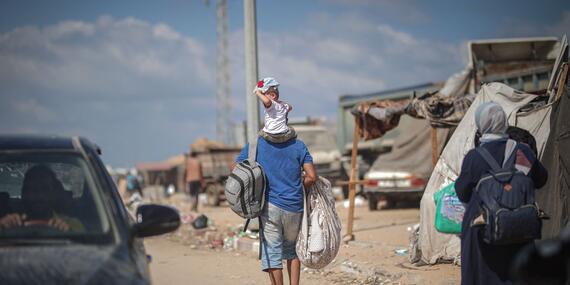Today's top news: Occupied Palestinian Territory, Sudan, Ukraine

Occupied Palestinian Territory
OCHA reports that the flurry of evacuation orders in August continue to worsen the humanitarian crisis in Gaza, with new orders issued over the weekend.
The total number of evacuation orders issued in August is now 16, directly impacting approximately 258,000 people, or around 12 per cent of Gaza’s population.
Since Friday, the Israeli military has issued three new evacuation orders for over 19 neighborhoods in Northern Gaza and in Deir al Balah, with more than 8,000 people staying in these areas, many sheltering in 29 displacement sites.
In Deir Al Balah, the orders have displaced UN humanitarian staff, non-governmental organizations (NGOs) and service providers, along with their families. These relocations took place at short notice and in dangerous conditions.
OCHA is particularly worried about the order issued yesterday for a part of Deir al Balah. It affected 15 premises hosting UN and NGO aid workers, four UN warehouses, Al Aqsa hospital, two clinics, three wells, one water reservoir and one desalination plant. All of these are either in or near the designated area.
This effectively upends a whole lifesaving humanitarian hub that was set up in Deir al Balah following its evacuation from Rafah back in May, and it severely impacts our ability to deliver essential support and services.
In a social media post, the Director-General of the World Health Organization (WHO), Tedros Ghebreyesus, said that nearby health facilities are now at risk of becoming non-functional. Many patients and staff have left Al Aqsa hospital, reducing healthcare capacity as hostilities intensify.
Water production in Deir al Balah has reduced by 85 per cent due to loss of access to water sources in areas designated for evacuation in August.
Only about 11 per cent of the Gaza strip has not been placed under evacuation orders. Most people in Gaza are now squeezed in this small, overcrowded, polluted area. where services are poor, and which is unsafe, just like the rest of the Gaza Strip.
After the first confirmed case of Polio, humanitarian partners say at least 50,000 children born since the crisis erupted are highly unlikely to have received any immunizations due to the collapsed health system.
Yesterday, 25 August, UNICEF confirmed that 1.2 million doses of Polio Vaccine Type 2 were brought into Gaza to immunize more than 640,000 children, together with WHO and UN Relief and Works Agency for Palestine Refugees in the Near East.
Meanwhile, the World Food Programme (WFP) says that their operations are severely hampered by intensifying conflict, the limited number of border crossings and damaged roads.
In the last two months, WFP has managed to bring in only half of the 24,000 metric tons of food aid required for operations serving 1.1 million people in Gaza. WFP has also had to reduce the contents of food parcels.
WFP also warns that shell craters and debris is make driving slow and challenging for truck drivers even in dry weather. In two months, when rain and flooding is expected, most roads will become unusable.
WFP says that aid workers grapple daily with slow authorizations and frequent refusals when they ask for permission to move. Looting and problems of public order are also frequent, especially when convoys have to wait for hours at holding points.
Sudan
OCHA reports that the Arba’at Dam, located approximately 38 kilometers northwest of Port Sudan in Sudan's Red Sea state, suffered extensive damage due to heavy rains yesterday, 25 August.
Preliminary reports indicate the breach resulted in the dam reservoir being fully drained, resulting in at least four deaths, although the total number of casualties could be much higher. The breach has also reportedly caused extensive damage in 20 villages located downstream, including in Khor-Baraka and Tukar, where residents were reportedly forced to flee for safety.
Floodwaters have caused damage to telecommunication networks, water and power supplies and road access in the impacted areas, making it difficult to gather information on the situation. Humanitarian partners and local authorities are assessing the affected areas and will have additional clarity on the extent of the damage in the coming days.
The Arba’at Dam is a crucial facility for Port Sudan, serving as a primary source of freshwater for the city. The reported damage is expected to have a substantial impact on water supplies to Port Sudan, exacerbating the humanitarian situation.
Ukraine
Ukraine's Humanitarian Coordinator, Matthias Schmale, condemned the massive attack by the Russian Armed Forces today which reportedly caused some 20 civilian casualties and damage to civilian and energy infrastructure in 15 oblasts across the country. This is according to the Government of Ukraine.
This comes after intense hostilities over the weekend which reportedly caused 60 civilian casualties, including among journalists, in the Donetsk, Kharkiv and Sumy Regions, and resulted in damage and destruction of homes and other civilian infrastructure. Humanitarian partners report that the local residents in these regions continue to flee for safety with mandatory evacuations announced in several towns.
Humanitarian organizations responded immediately after the massive attacks across Ukraine, distributing emergency shelter kits to cover damaged windows and roofs.
